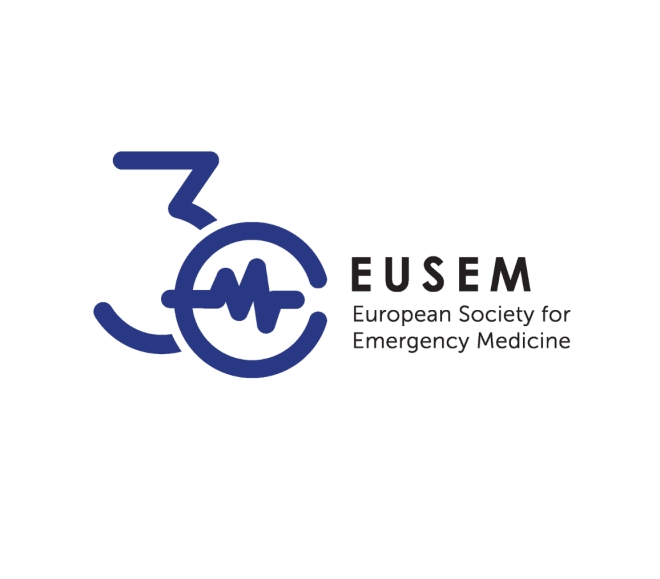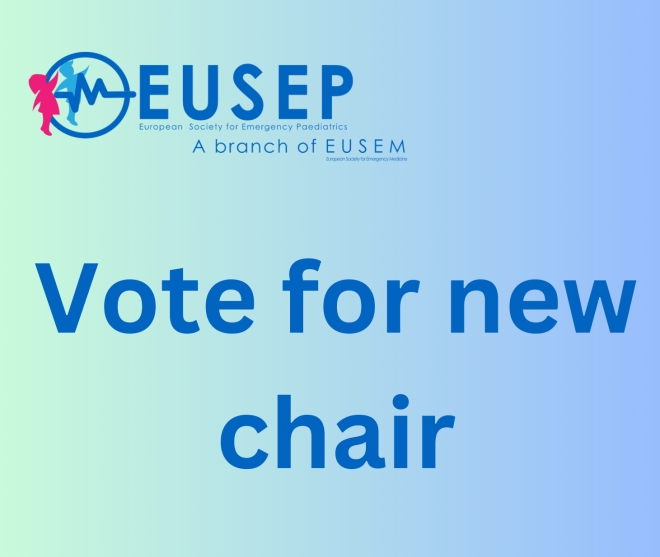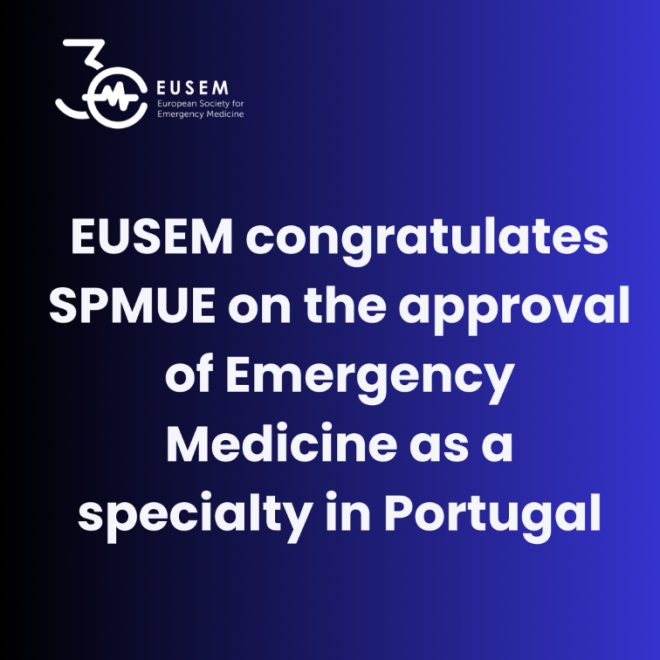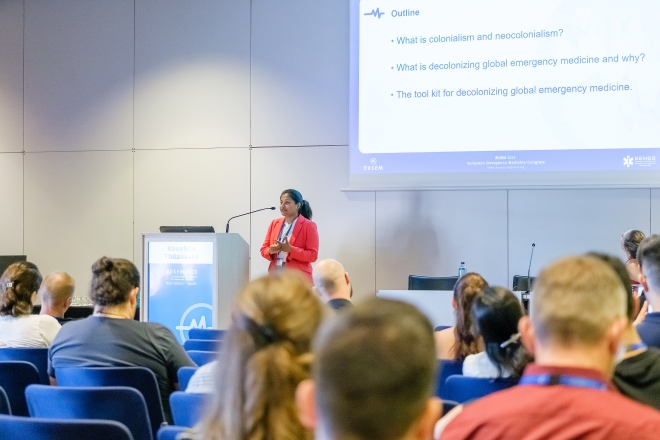PRESS RELEASE
Embargo: 16:30 hrs CEST on Sunday 13 October 2024
Climate change is a health emergency too
International experts warn of impact on emergency medical services worldwide
Copenhagen, Denmark: International experts in emergency medicine have warned that climate change is likely to have a severe impact on emergency services around the world. Despite this, few countries have assessed the scale of the impact or have a plan to deal with it.
In a special session at the European Emergency Medicine Congress today (Sunday), Luis Garcia Castrillo, a professor in emergency medicine, now retired, at the Hospital Marqués de Valdecilla, Santander, Spain, described how he and colleagues from EUSEM’s Emergency Medicine Day working group had asked 42 focus groups, consisting of experts in emergency medicine, prehospital care and disaster medicine, in 36 countries in 13 UN regions of the world to complete a survey on climate change awareness and preparedness [1]. The research is due to be published in the European Journal of Emergency Medicine [2].
“On a scale of 0 to 9, they rated the severity of the impact of climate change on health systems and specifically on emergency care, both now and in the future, at an average of 7,” he said. “This is a high figure, especially as some regions, such as northern Europe, consider it to be less of a problem than do other countries, such as Australia.
“The focus groups considered that the impact of climate change on emergency medical services would be similar or even higher than on global health systems. However, only 21% of the focus group members reported that assessments of the effect of climate change on emergency medical services had been carried out, and only 38% reported any measures had been taken to prepare for the impact of climate change .
“Out of all the focus group respondents, 62% said their governments or policy makers had made no assessment of the impact of climate change on emergency services, 9% said they didn’t know, 55% said nothing had been done to prepare for the impact of climate change, and 10% didn’t know.
“It is surprising how awareness is lacking in so many countries, as well as among emergency medicine societies. Some countries do not seem to be concerned at all. Yet this is going to affect rich and poor countries alike.”
Dr Roberta Petrino, director of the Emergency Department at Ente Ospedaliero Cantonale, Lugano, Switzerland, co-chaired the session “Climate change is a health emergency too”, and is a co-author of the report.
She said: “One interesting finding is that the need to implement actions to mitigate climate change is considered important everywhere. In particular, our survey showed the need to strengthen emergency medicine services and education programmes for medical students and emergency medicine doctors, as well as research.
“Emergency medical professionals are very worried about the effects of climate change on the care they provide. Our report shows that colleagues feel it’s an important problem around the world, although specific issues vary from one region to another and these relate to geographical position, the economic situation and the types of risks.”
Between 15 February and 15 March 2024, the researchers asked national and international emergency medicine associations around the world to set up focus groups of between four to six members to answer a series of questions. The 42 focus groups reported on general awareness and concern about climate change, and then ranked in terms of severity the different threats, the possible impacts on emergency medical departments, and, finally, the measures needed to mitigate the problems.
Across all the focus group responses, the top three major risks were pollution, flooding and heatwaves. Three minor risks were cold spells, wildfires and vector-borne diseases, such as malaria. The greatest impact was expected to be an increase in demands on the emergency medical services. The focus groups ranked preparation of strategic plans and education as the two strategic actions that were most important.
Focus groups from high income countries were most concerned about the risks of heatwaves, cold spells and wildfires. They considered the greatest impact would be increased numbers of patients, and they thought education and preparation of strategic plans were the most important actions necessary to mitigate the risks. Countries in northern Europe and the eastern Mediterranean were very concerned about displacement of populations and disruption to basic services.
Focus groups from low and middle-income countries ranked the impact of climate change on food production and disruption to health services as being the most significant risks.
Analysis of the data by region showed that climate change was expected to have a greater impact in Australasia, and countries in Eastern Europe, South Asia, South Saharan Africa and Central America. Countries such as Egypt and Nigeria expected the lowest impact, while South Saharan African regions expected the highest. There were significant differences between regions for the risks of vector-borne disease, climate-related diseases, wildfires, extreme weather events and food shortages. Australasia, Central America and South Saharan Africa had the greatest concerns about these compared to European regions.
The focus group concerns were also analysed through the WorldRiskIndex, a statistical model that assesses the risk of 193 countries falling victim to humanitarian disasters caused by extreme natural events and climate change. It ranks countries from very low risk through to very high risk. The fear of increased demand for emergency medical services, and disruption to the chain of supplies and health services was directly related to WorldRiskIndex, with concerns growing with increasing risk.
“It is clear from our findings that climate change is expected to have a significant impact on emergency medical services,” said Dr Petrino. “Much greater awareness of this is needed at national and international level among policymakers, healthcare providers, healthcare professionals and the general public.
“The European Society of Emergency Medicine calls for nations to put in place plans to mitigate the impact on our services from climate change. In addition to publishing our findings, the Society will be setting up a permanent working group to support, help and monitor actions for mitigating the effects of climate change on the emergency medical services. We will also be talking to key people and institutions to raise awareness.
“As we head towards the end of a year that has seen records broken for the planet’s hottest days, action cannot come quickly enough. Climate change is having an impact on all countries, rich and poor, regardless of geographical region. The world faces a climate change emergency, and our medical services face an emergency too.”
Prof. Garcia-Castrillo and Dr Petrino thanked the emergency medicine community and societies worldwide, who had made it possible to conduct the survey.
(ends)
[1] “The results of the survey on awareness and preparedness for climate change” presented by Luis Garcia-Castrillo, in the session “EM Day Campaign 2024: climate change is a health emergency too!”, 16:30 hrs CEST, Room D4-D5.
[2] “Awareness and preparedness of health systems and emergency medicine systems to the climate change challenges and threats: an international survey”, by Roberta Petrino, Luis Garcia-Castrillo, Graziano Uccheddu, Letizia Meucci, Roberta Codecà. To be published soon in the European Journal of Emergency Medicine.
The study received no funding.
About European Society of Emergency Medicine (EUSEM)








